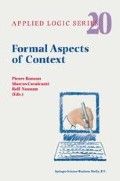Abstract
A difficult task encountered in machine learning, as in many other domains, is to achieve generality. Briefly, a solution to a problem is said to be general when it is not bound to data instances describing the problem. In other words, generality allows for the abstraction of solution classes from specific problems. This article presents an attempt to use formalized contexts as a way to achieve generality in machine learning.
Access this chapter
Tax calculation will be finalised at checkout
Purchases are for personal use only
Preview
Unable to display preview. Download preview PDF.
References
G. Attardi and M. Simi. Proofs in Contexts. In Proceedings 4th International Conference on Principles of Knowledge Representation and Reasoning (KR 94 ), 1994.
P. Bonzon. A Reflexive Proof System for Reasoning in Contexts. In Proceedings 14th National Conference on Artificial Intelligence (AAAI 97 ), 1997.
Bowen and Kowalski, 1982] K. Bowen and R. Kowalski, Amalgamating Language and Metalanguage in Logic Programming. In Logic Programming, K. Clark and S. Tarnlund (eds), Academic Press, 1982.
Buvac et al., 1995] S. Buvac, V. Buvac and I. A. Mason. Metamathematics of contexts, Fundamenta lnformaticae,23 (3), 1995.
S. Buvac. Quantificational Logic of Context. In Proceedings 13th National Conference on Artificial Intelligence (AAAI96), 1996.
F. Giunchiglia and L. Serafini. Multilanguage hierarchical logics, or: how can we do without modal logics, Artificial Intelligence, 65, 29–70, 1994.
F. Giunchiglia and A. Cimatti. Introspective Metatheoretic Reasoning. In Proc. 4th Internat. Workshop on Meta Programming in Logic (META 94 ), 1994.
A. Hutchinson. Algorithmic Learning, Clarendon Press, Oxford, 1994.
S. Jefferson and D. Friedman. A Simple Reflective Interpreter. InY.Yonezawa and B. Smith (eds.), Reflection and Meta-Level Architecture, Proc. IMSA Workshop, 1992
M. Kalsbeek. Correctness of the Vanilla Meta-Interpreter and Ambivalent Syntax. In K. Apt and F. Turini (eds.), Meta-Logics and Logic Programming, MIT Press, 1995.
J. McCarthy. Notes on Formalizing Context. In Proceedings. 13th International Joint Conference on Artificial Intelligence (IJCAI93), 1993.
S. Russell. Execution Architectures and Compilation. In Proceedings 11th International Join Conference on Artificial Intelligence (IJCAI89), 1989.
B. C. Smith. Reflection and Semantics in Lisp, Conference Records. In Proceedings of the 11th ACM Symposium on Principles of Programming Languages (POPL 84 ), 1984.
R. Weyhrauch. Prolegomena to a Theory of Mechanized Reasoning, Artificial Intelligence, 13 (1), 133–176, 1980.
Author information
Authors and Affiliations
Editor information
Editors and Affiliations
Rights and permissions
Copyright information
© 2000 Springer Science+Business Media Dordrecht
About this chapter
Cite this chapter
Bonzon, P. (2000). Contextual Learning: Towards Using Contexts to Achieve Generality. In: Bonzon, P., Cavalcanti, M., Nossum, R. (eds) Formal Aspects of Context. Applied Logic Series, vol 20. Springer, Dordrecht. https://doi.org/10.1007/978-94-015-9397-7_8
Download citation
DOI: https://doi.org/10.1007/978-94-015-9397-7_8
Publisher Name: Springer, Dordrecht
Print ISBN: 978-90-481-5472-2
Online ISBN: 978-94-015-9397-7
eBook Packages: Springer Book Archive

